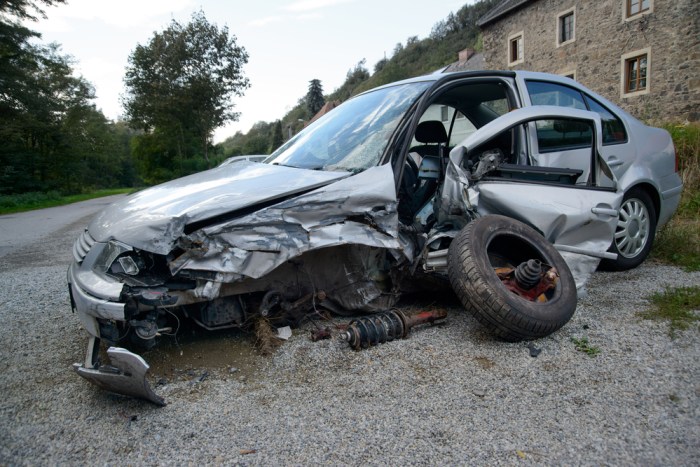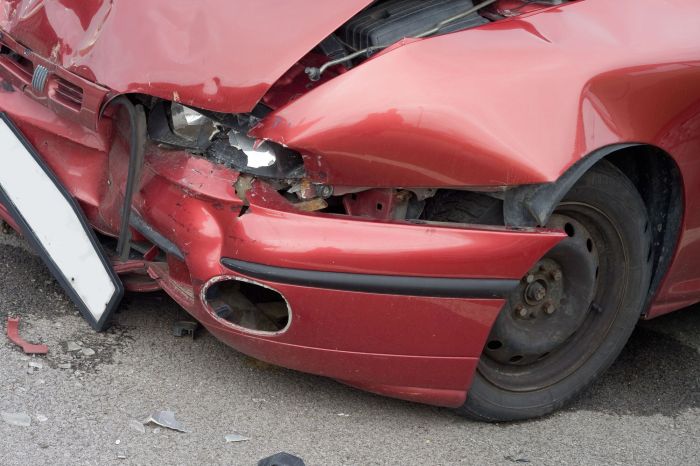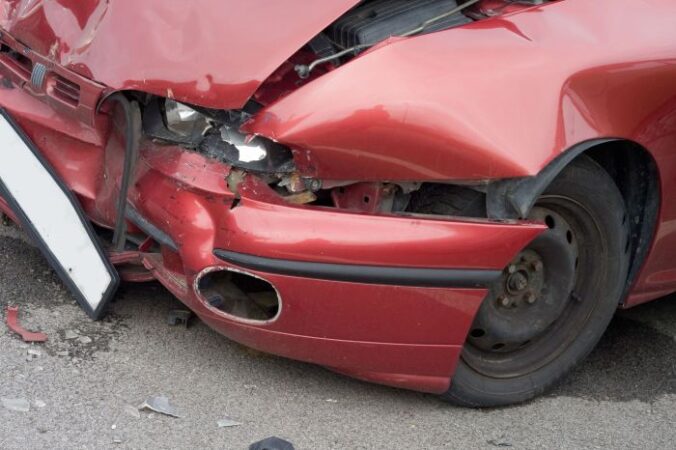
When do insurance companies total a vehicle – Ever been in a car accident and wondered, “Will my car be totaled?” It’s a question that crosses many minds after a fender bender, a collision, or even a hailstorm. Knowing when insurance companies deem a vehicle a total loss is key to understanding your rights and options. The decision hinges on a complex mix of factors, including the vehicle’s value, the extent of the damage, and the cost of repairs. But, like a good mystery novel, there’s more to the story than meets the eye.
Insurance companies use a set of criteria to determine if a vehicle is a total loss, and it’s not always a simple calculation. They’ll consider the market value of your car, the cost of repairs, and the age and condition of the vehicle. Sometimes, even if the repairs are less than the market value, a car can still be totaled, especially if the damage is severe or the repairs are deemed unsafe. This is where the intrigue kicks in, and understanding the process becomes essential.
Factors Determining Total Loss
When your car gets smashed, you might wonder if it’s a total loss. Insurance companies have a pretty strict formula for deciding whether to write off your ride. It’s not just about how bad the damage looks, but also about the cost of fixing it compared to its value.
Market Value and Repair Costs
Insurance companies consider the market value of your vehicle and the estimated cost of repairs to determine if it’s a total loss. They’ll use a variety of resources to figure out the market value, such as:
- Used car pricing guides like Kelley Blue Book or Edmunds.com.
- Auction data to see what similar cars are selling for.
- Local dealer quotes for comparable vehicles.
The repair costs are based on estimates from qualified mechanics, considering the extent of damage and the availability of parts.
Situations Where a Vehicle Might Be Totaled Even if the Repair Costs Are Less Than the Market Value
Here’s where things get interesting. Sometimes, even if the repair costs are less than the market value, a car might still be totaled. This can happen due to:
- Safety concerns: If the damage affects critical safety features, like the airbags, frame, or steering, even minor repairs might not be enough to ensure the car is safe to drive.
- Extensive damage: Even if the cost of repairs is less than the market value, the damage might be so extensive that it’s simply not worth fixing. This can happen with major accidents that involve significant structural damage.
- Parts availability: If specific parts are difficult to find or extremely expensive, the cost of repairs might exceed the vehicle’s market value. This can be a challenge with older or rare vehicles.
- Insurance company policy: Each insurance company has its own set of rules and guidelines for determining total losses. Some companies might have a “total loss threshold” where a vehicle is totaled if the repair costs exceed a certain percentage of its market value.
Factors Used by Different Insurance Companies
Insurance companies have their own methods for determining total losses, but here are some common factors they consider:
- Age and mileage: Older vehicles with high mileage might be more likely to be totaled because they are worth less.
- Vehicle’s condition: A well-maintained car might be more likely to be repaired, while a vehicle with pre-existing damage or poor maintenance might be totaled more easily.
- Location: The cost of repairs can vary depending on the location, so this can influence the total loss decision.
The Total Loss Threshold: When Do Insurance Companies Total A Vehicle

The total loss threshold is a crucial factor in determining whether an insurance company will declare a vehicle a total loss after an accident. It’s the point where the cost of repairs exceeds the vehicle’s actual value, making it financially more sensible to declare it a total loss and pay out the insured amount. This threshold is a complex calculation that considers several factors, including the vehicle’s age, make, model, and the extent of damage.
Factors Influencing the Total Loss Threshold
The total loss threshold is not a fixed amount; it varies depending on several factors. The age, make, and model of the vehicle play a significant role in determining its value. Older vehicles tend to have a lower threshold due to depreciation, meaning they lose value over time. Similarly, luxury or high-performance vehicles generally have higher thresholds because their initial value is higher.
- Vehicle Age: Older vehicles depreciate faster, meaning their value decreases more rapidly. This results in a lower total loss threshold. For example, a 10-year-old car might be totaled with less damage than a newer car because its value is already lower.
- Vehicle Make and Model: Certain vehicle makes and models are more expensive to repair due to specialized parts or complex systems. These vehicles might have a higher total loss threshold. For instance, a high-end sports car with intricate engine components could have a higher threshold than a standard sedan.
- Market Value: The market value of a vehicle is a key factor in determining the total loss threshold. This value is influenced by factors like supply and demand, condition, and mileage. If a vehicle’s market value is low, it may be totaled even with relatively minor damage.
- Repair Costs: The cost of repairs is the primary factor determining whether a vehicle is totaled. If the repair costs exceed a certain percentage of the vehicle’s value, it’s likely to be declared a total loss.
Totaled Vehicles with Repair Costs Below the Threshold, When do insurance companies total a vehicle
In some cases, a vehicle may be totaled even if the repair costs are below the threshold. This can happen due to:
- Safety Concerns: If the damage is extensive, even if the repair costs are below the threshold, an insurance company may deem the vehicle unsafe to drive. This is often the case with structural damage to the frame or significant damage to safety features like airbags or seatbelts.
- Availability of Parts: If the vehicle has been in a serious accident, obtaining replacement parts may be difficult or impossible. This can significantly increase repair costs and lead to the vehicle being totaled, even if the damage itself isn’t extensive.
- Insurance Company Policy: Each insurance company has its own internal policies and procedures regarding total loss declarations. Some companies may have a lower threshold for certain types of vehicles or accidents.
Salvage Value
The salvage value is the estimated value of a vehicle after it has been declared a total loss. This value can be used to offset the cost of the total loss claim. The insurance company will typically deduct the salvage value from the payout to the insured.
The salvage value is typically determined by an auction or by the insurance company’s own assessment.
The salvage value can impact the total loss determination in several ways:
- Higher Salvage Value: If a vehicle has a higher salvage value, it’s less likely to be totaled because the insurance company can recover more money from selling it. This means the repair costs would have to be significantly higher to justify totaling the vehicle.
- Lower Salvage Value: If a vehicle has a lower salvage value, it’s more likely to be totaled because the insurance company won’t recover as much money from selling it. This makes it more financially beneficial to declare the vehicle a total loss and pay out the insured amount.
Protecting Yourself

You’ve been in an accident, and your insurance company has declared your vehicle a total loss. It’s a stressful situation, and you want to make sure you’re getting a fair deal. While the process can feel overwhelming, you have rights and options.
Knowing your rights and the terms of your policy is key to protecting yourself from being unfairly declared a total loss.
Negotiating with the Insurance Company
Negotiating with the insurance company can feel like a David vs. Goliath battle. But with the right approach and information, you can ensure a fair settlement.
- Gather Evidence: Before contacting your insurance company, document everything related to the accident. Take photos of the damage, gather repair estimates from reputable mechanics, and keep a detailed record of all communication with the insurance company.
- Know Your Vehicle’s Value: Use online tools like Kelley Blue Book or Edmunds to determine your vehicle’s fair market value before the accident. This will help you understand if the insurance company’s offer is reasonable.
- Be Prepared to Negotiate: The initial offer from the insurance company is often not the final offer. Be prepared to negotiate and explain why you believe the offer is too low. Be polite, but firm.
- Consider an Independent Appraisal: If you disagree with the insurance company’s assessment, consider getting an independent appraisal from a qualified professional. This will provide a neutral assessment of your vehicle’s value.
- Understand Your Rights: Familiarize yourself with your state’s laws regarding total loss settlements. You might have the right to choose a repair shop or receive a cash settlement instead of a replacement vehicle.
Understanding Your Insurance Policy
Knowing the terms of your insurance policy is crucial, especially when it comes to total loss provisions.
- Total Loss Threshold: Understand the threshold for declaring a vehicle a total loss. This is typically determined by the cost of repairs exceeding a certain percentage of the vehicle’s value.
- Depreciation: Your policy might include depreciation, which reduces the value of your vehicle over time. This can affect the total loss settlement amount.
- Actual Cash Value (ACV): Most insurance policies pay out the actual cash value (ACV) of your vehicle, which is the market value minus depreciation.
- Gap Coverage: If you owe more on your vehicle loan than its ACV, gap coverage can help cover the difference.
Resources for Policyholders
If you’re struggling to navigate the total loss process, several resources can help.
- Your Insurance Agent: Your insurance agent is your first point of contact for any questions or concerns.
- State Insurance Department: Contact your state’s insurance department if you feel your insurance company is not handling your claim fairly.
- Consumer Protection Organizations: Organizations like the National Association of Insurance Commissioners (NAIC) can provide information and assistance.
- Legal Counsel: If you’re unable to reach a settlement with your insurance company, you may want to consult with an attorney specializing in insurance law.
Epilogue

So, while a totaled car might feel like the end of the road, it’s not necessarily the end of your story. Understanding the factors involved, the total loss process, and your options after a total loss declaration can help you navigate this tricky situation. Remember, you’re not alone in this. Don’t be afraid to ask questions, and seek guidance from your insurance company or a trusted advisor. And, who knows, maybe you’ll even find a silver lining in this unexpected turn of events!
Question & Answer Hub
What if my car is totaled, but I still want to keep it?
In some cases, you may be able to purchase your totaled vehicle from the insurance company at a discounted price. This is known as “salvage value,” and it’s often significantly lower than the car’s pre-accident value. You’ll then need to obtain a salvage title, which limits the car’s resale value.
How do I appeal a total loss decision?
If you disagree with the insurance company’s total loss determination, you can appeal their decision. This usually involves providing additional documentation, such as repair estimates from other mechanics, to support your claim. Be prepared to present your case clearly and persuasively.
What happens to my insurance premiums after a total loss?
Your insurance premiums might increase after a total loss claim. This is because insurance companies view total loss claims as a higher risk. However, the impact on your premiums will depend on your insurance company, your driving record, and other factors.





